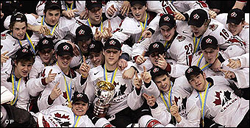Sometimes, Sports Isn't About Politics
Why did Canadians boo the U.S. hockey team? Because it sucked.
![]()

![]()
"When I scored that final goal, I finally realized what democracy was all about." Those were Paul Henderson's immortal words, we're told, after his stunning last-minute game-winner in the 1972 hockey series between the Soviet Union and Canada.
Before and since, athletes, politicians, the public, and the media have projected politics onto international sport. Back then, for us, it was rugged Canadian individualism versus the automatons of Communism. Good thing we won.
Lately, it's been Canada versus the U.S. at the World Junior Hockey Championships. Why have Vancouver crowds been so inhospitable to our American brethren? Global politics, declared USA Today hockey writer Kevin Allen. "It's a shame that world events have led to this fracture in Canadian-American relations."
"There are legitimate places for expressions of anti-Americanism, but I don't think a hockey rink is one of them," added the Vancouver Sun's Pete McMartin. He was particularly offended that Vancouverites chanted "U.S. sucks" when the American team played the Russians on January 2. He implied we should cheer for the Americans because they are our neighbours, and share our values, and because they are not, like the Russians, only a generation removed from a regime of "soul crushing despotism".
"When the hockey louts start chanting the same slogans as the local Trotskyist cell, you know you have an ugly trend," he declared. In other words, unless you're cheering for us against them, politics has no place in sports.
Myself, I like projecting politics on sports as much as the next ink-stained wretch, but I try to do it in jest.
A sense of ownership
Here's another explanation for the U.S. squad's Canadian reception. The Globe and Mail declared the team the prohibitive favourites to win this tournament. Most pundits, including Allen, shared that view. Like the Soviets of the 1970s and early 80s, like the Czechs of the late 1990s, Americans were beginning to presume that they deserved to beat us at our own game.
Nothing is more irritating to a Canadian hockey fan. Our paroxysms of self-doubt when we actually lose an international hockey tournament are evidence enough of the stakes. When a foreign team arrives in Canada with any measure of presumption, we're well primed to challenge it.
We're particularly sensitive to any whiff of American presumption. Hockey is important in the sports pantheon of Russia, the Czech Republic, Slovakia, Sweden, Finland, and even Switzerland. These countries have been an integral part of Canada's long international hockey history. They love hockey almost as much as we do.
Competition with Russia has defined our international sports identity. We like and respect the Russian team because of that. Competition with the United States generally means another January yawner against the Chicago Blackhawks. Only lately have actual Americans become any good at the sport. Not that anyone in Texas has noticed.
Then there is the little matter of U.S. defender Jack Johnson. On New Year's Eve, seconds after Canada scored the 3-2 goal in the last minute to win the game, the future superstar took aim at Canadian forward Steve Downie, who was trailing the play, and elbowed him in the head, leaving him stunned on his hands and knees. It was a filthy hit by a belligerent loser.
And so the boos turned to concerted chants of "U.S. sucks." Overconfident and undisciplined pretty much described the American team until that moment. Petulant and juvenile were a better fit afterward. A similar American elbow was delivered in a similar manner to a Finnish player after the U.S. fell behind 4-2 near the end of the bronze medal game.
Allen wrote in USA Today that Johnson was penalized for "seemingly throwing an elbow or forearm at Canada's Steve Downie". When it comes to the political thinking of Canadian hockey fans, Allen is unequivocal. When a U.S. hockey player clotheslines a Canadian one in plain view, his clarity of vision seems to fail him.
Pure Canadians?
Of course, filth in hockey is hardly the exclusive province of the U.S. team, and we tend to discount it when it happens on our side. Take Game 6 of the 1972 Canada-Soviet series, when Bobby Clarke deliberately broke Russian star Valeri Kharlamov's leg with a brutal slash. It's also worth noting that the player Johnson clotheslined, Steve Downie, was suspended for five games in October after he cross-checked Windsor Spitfires teammate Akim Aliu in the mouth. Aliu had objected to being locked naked with three other players in the washroom of the Spitfires' bus.
Sports is riddled with metaphors, ironies, politics, and the occasional act of mindless brutality. For all these reasons, it's a great canvas for storytelling. Some of which is fiction. That Paul Henderson quote about freedom and democracy? Globe sports writer Dick Beddoes has since declared that he actually said "I shot it again and it went right along the ice. And I saw it go in. Holy Jeez!"
Beddoes may have been joking, but it still sounds much more likely.
Sometimes the best thing about sports is that it isn't about politics. For the last 10 days, about 200 talented young athletes played hockey with infectious passion and enthusiasm. The Russians were the most skilled, and many of them wept when they lost the final game on Thursday. Canada beat them with clean, hard lunch-bucket play in a contest as good as any you're likely to see. The U.S. team, well, throughout the tournament they seemed as self-important and confused as the pundits.
And the Canadian fans? For now, at least, it's our game and we'll boo if we want to.
Charles Campbell is a contributing editor to The Tyee.



What have we missed? What do you think? We want to know. Comment below. Keep in mind:
Do:
Do not: